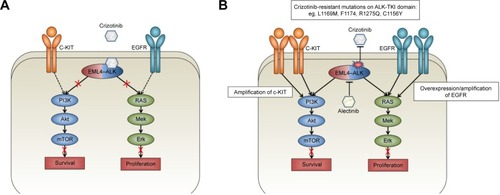Figures & data
Figure 1 EML4–ALK pathways and the mechanism of resistance to crizotinib.
Notes: (A) Crizotinib binds to the ALK-TKI domain of the EML4–ALK fusion protein and inhibits downstream signaling of canonical oncogenic pathways such as the PI3K pathway and RAS pathway. (B) Acquired resistance to crizotinib occurs after crizotinib treatment due to mutations in ALK. In addition, amplification of C-KIT and/or increased EGFR signaling can cause progression, independent of EML4–ALK. Cells remain ALK driven, and alectinib successfully improves PFS by inhibiting several ALK mutations that cause crizotinib resistance.
Abbreviations: EML4–ALK, echinoderm microtubule-associated protein-like–anaplastic lymphoma kinase; ALK, anaplastic lymphoma kinase; TKI, tyrosine kinase inhibitor; PI3K, phosphoinositide 3-kinase; RAS, rat sarcoma protein; C-KIT, proto-oncogene C-KIT; EGFR, epidermal growth factor receptor; PFS, progression-free survival; mTOR, mechanistic target of rapamycin; Mek, mitogen-activated protein kinase; Erk, extracellular signal-regulated kinase.
Abbreviations: EML4–ALK, echinoderm microtubule-associated protein-like–anaplastic lymphoma kinase; ALK, anaplastic lymphoma kinase; TKI, tyrosine kinase inhibitor; PI3K, phosphoinositide 3-kinase; RAS, rat sarcoma protein; C-KIT, proto-oncogene C-KIT; EGFR, epidermal growth factor receptor; PFS, progression-free survival; mTOR, mechanistic target of rapamycin; Mek, mitogen-activated protein kinase; Erk, extracellular signal-regulated kinase.

Table 1 Resistance mutations in ALK
Table 2 Pharmacokinetics of ALK inhibitors
